Local radio journalists trained by Internews are helping people in remote areas of Tanzania to access vital news much faster than before. That’s because their radio broadcasts are spreading information alongside the traditional public notice boards in village squares.
Jumanne Mlowoko of Songwe district says information on the notice boards is rarely updated: “I missed out on free medical treatment because I did not know that specialist doctors were in our village two weeks after they’d left!”
Elizabeth Nyagawa lives in the small town of Makambako in Njombe region and says when collecting taxes, government officials use every means to reach citizens quickly, but not when it comes to sharing information that might actually help people:
“For example, they say women and young people can apply for affordable loans, but there is not enough information on government notice boards.”
Official suggestion boxes can be a problem, too. They can be hard to find, and Christopher Sanga says he complained more than ten times about his local hospital but got no response:
“The government ignores us, so why should we make suggestions or read their notice boards?”
But when Internews-trained journalists, such as Safari FM’s Betina Contine, started reporting on these problems, things changed.
Mtwara District Council’s Communication Officer Issack Bilal says it was a wake-up call: “We have to thank Safari FM. After we heard their program, we started a new campaign about suggestion boxes and now ensure they’re available in all public offices and health centers.”
Information Officer John Kilua adds, “We’re exploring different ways to collect views and respond promptly across the region.”
Ice FM’s Cliff Mlelwa in Makambako agrees that change is in the air: “After we reported on the problem of boxes and notice boards, I visited hospitals and ward offices more than four times and saw new information and feedback published every day.”
All agree that investigative programs by Internews’ partner community radio stations are helping to spread vital information on health services, local revenue, expenditure, and loans.
Amina Mwailubi lives in Isyonje village in Mbeya and says: “I urge the government to use community radio stations. It’s not enough to post vital information on notice boards or in crowded government offices. People haven’t got the time or means to find out.”
Boresha Habari is a five-year media and civil society strengthening program implemented by Internews in Tanzania and funded by the United States Agency for International Development (USAID).
